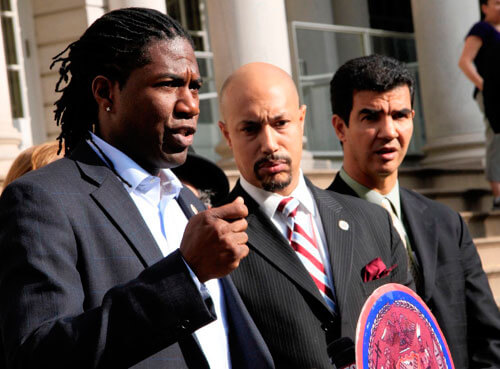Six members of New York City Council has urged the Obama administration not to resume deportation of Haitians before Temporary Protected Status (TPS) for tens of thousands of Haitians living illegally in the U.S. expires in July.
This month, the administration said it was resuming the deportation of Haitians who have finished serving time in U.S. jails for violent crime.
In a letter to Janet Napolitano, Secretary of the Department of Homeland Security, the New York City Council members, including two Caribbean nationals – Haitian-born Dr. Eugene Mathieu and Grenadian American Jumaane Williams – said the conditions on the ground in Haiti, one year after the devastating earthquake, remain “severe.”
“Removing Haitians at this time would not only put those removed at risk but also hamper efforts of Haitians to rebuild their country, homes, and lives,” they said in the letter dispatched on Jan. 19.
The letter was also signed by Daniel Dromm, chair, of the Council’s Immigration Committee. Other signatories comprised Council members Annabel Palma, Larry B. Seabrook and G. Oliver Koppell.
“One year since the earthquake, the Haitian people are still suffering a series of social and political crises. Individuals removed to Haiti face a range of public health issues, including lack of access to clean drinking water and food, as well as an inadequate public sanitation,” they added in the letter. “These factors have already contributed to a deadly cholera epidemic.”
The legislators noted that more than a million Haitians currently live in tents or other makeshift housing “due, in part, to the fact that a mere 5 percent of the buildings have been reconstructed.”
In addition, they said that Haiti is suffering from “much higher levels of violent crime and overwhelmed police and security forces,” adding that the civil strife since the Nov. 28 presidential elections is “compounding these problems.”
“Resuming removals would only serve to hinder Haiti’s recovery efforts and expose removed individuals to an unreasonably high risk of harm,” the legislators said.
Last week, six human rights groups in Miami and Washington filed an emergency petition with the Inter-American Commission on Human Rights (IACHR) to halt the deportation of Haitians by the United States.
The petition – submitted by the University of Miami School of Law Human Rights and Immigration Clinics, the Florida Immigrant Advocacy Center, the Center for Constitutional Rights, Alternative Chance and the Loyola Law Clinic and Center for Social Justice – argued that deporting people at this moment to Haiti will result in “serious human rights violations.”
“It is simply unconscionable to resume deportations to Haiti on the one-year anniversary of one of the most devastating natural disasters in world history, especially as a cholera epidemic rages across the country,” said Caroline Bettinger-Lopez, director of the Human Rights Clinic at the University of Miami School of Law.
In addition to resuming the deportation of Haitians who have finished serving time for violent crime, the Obama administration said it was becoming stricter in granting Haitians humanitarian parole, which is used sparingly to bring in someone otherwise inadmissible to the United States temporarily due to a “compelling emergency.”
In July last year, the immigration authorities said they were giving Haitian another six months to apply for TPS. The initial deadline for applications was July 2010.
In a move supported by both Democrats and Republicans, the Obama administration, shortly after the January 12, 2010 earthquake in Haiti, extended special protection to about 100,000 Haitians living illegally in the United States that keeps them from being deported.
At the time, the Department of Homeland Security said it would offer Haitian nationals TPS for 18 months.
That status, which allows undocumented Haitians to legally work, does not cover Haitians who flee their country following the devastating 7.0 quake that resulted in an estimated 300,000 deaths and left 1.5 million people homeless.
The U.S. had typically extended TPS to immigrants from countries – such as El Salvador, Honduras, Somalia, and Nicaragua – where sudden conflict or disaster has prevented them from returning safely.























